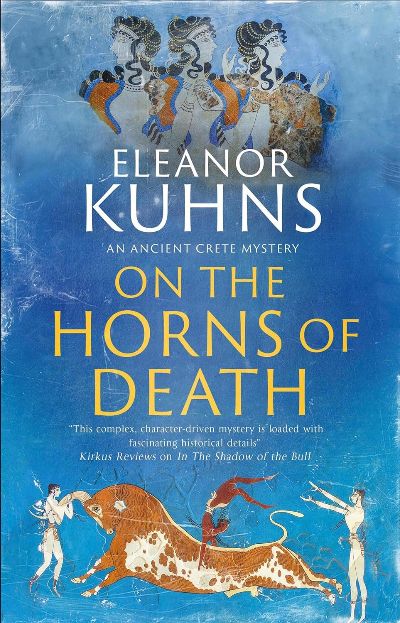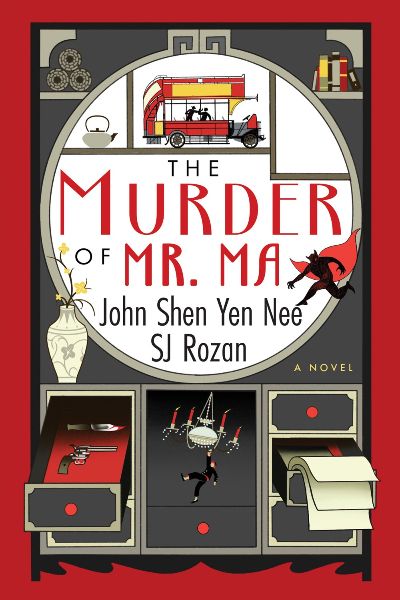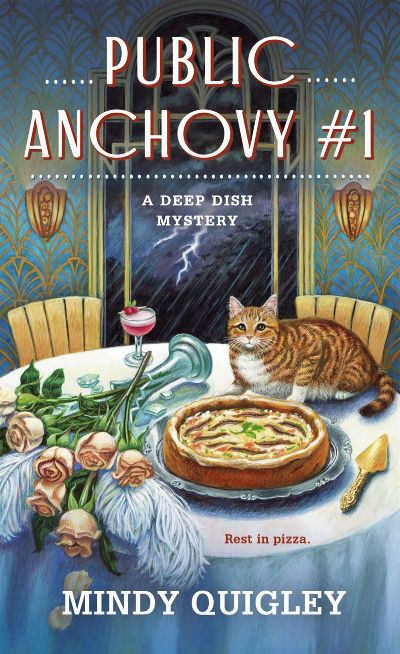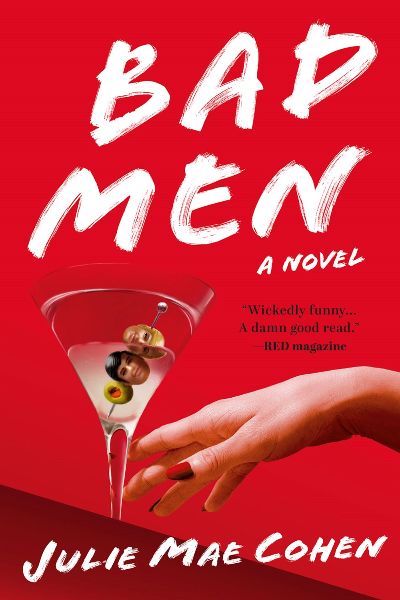A wonderful sojourn into Ancient Crete of 1450 BC, told through the life of 16-year-old bull leaper Martis. In many ways, Martis is a classic teen, trying to understand the world around her and what her place in it will be. She’s also fiercely independent—training to be a bull leaper without initially telling her mother, for example—and resists many of the traditional female roles, like marriage and motherhood, that her peers are taking up. In this second novel in the series, Martis discovers the corpse of Duzi, one of her fellow bull leapers. He was murdered to look like he was gouged by a bull, when in fact he was knifed and left to die in a bullpen. Martis rebels against the wishes of her mother, as well as those of Tinos, the administrator of Knossos and the High Priestess’s consort, and takes on the investigation into Duzi’s death, a death that is followed by others, all related to the world of the bull leapers. Martis has to move quickly, with little help from the adults around her, to stop the growing violence. Kuhns does a great job of weaving Minoan civilization throughout the book, from religious practices to food preparation, from clothes and make-up to day-to-day life. Young adults will find much to enjoy in this novel as well.
Brian Kenney
A high-energy, rambunctious tale that shares much with Sherlock Holmes—the Guy Ritchie versions, that is—as well as traditional Chinese gong’an crime fiction, in which government magistrates solve criminal cases. It’s London, 1924 and Judge Dee Ren Jie, known as Judge Dee, has just arrived in the country to investigate the murder of a colleague whom he knew during World War I, when both served with the Chinese Labour Corps. No less a personage than Bertrand Russell introduces the Judge to Lao She, a retiring London academic who quickly becomes Dee’s sidekick—they are introduced in a prison breakout, it’s complicated—and the two set off to locate the victim’s family. One murder soon becomes two, then more, all performed with the distinctive butterfly sword, putting yet more pressure on Judge Dee to find the perpetrator before he or she tries to murder him. The authors do a wonderful job of depicting the bustling London of the ‘20s, the Chinese community and the relentless racism and stereotypes it is a victim of, and absolutely fabulous displays of martial arts. There’s word that Dr. Dee may be returning to solve another case; here’s hoping he does!
Delilah and the crew from her restaurant, the upscale pizzeria Delilah & Son (Son is short for Sonya, Delilah’s best friend and sous chef), are at Bluff Point, an opulent, old mansion on Wisconsin’s Geneva Bay. They’re catering the Friends of the Library’s fundraising gala—an opportunity to show off their skills and bolster the declining winter business—and the menu does look fantastic. Too bad that the guests hardly get to sample anything more than the appetizers when Edgar Clemmons, outgoing board chair—and quite bitter about his departure—falls down the staircase, landing at the bottom like a broken marionette. Murder or accident? It’s hard to say, since Edgar shared a number of vague secrets with several people before he took his tumble. The man’s demise sends many scurrying home, although a powerful storm has moved in—downed trees, exposed power lines—prohibiting law enforcement from reaching Bluff Point and keeping a dozen or so attendees, including Delilah and her staff, in the mansion for the night. Here the mystery morphs into a closed circle, with an assemblage that includes Delilah’s crush, police detective Calvin Capone; and Butterball, her cat, who takes on quite the active role in this title. As with the other books in the series, Quigley balances wonderful character development and plenty of low-key humor with the search for a killer. It’s hard to imagine a cozy fan who wouldn’t find this book to be a total delight.
At first, this novel seems to be a predictable, mildly entertaining thriller. Erin and Will take themselves off to marriage counseling because something has gone wrong, at least for Erin, who is suddenly putting her husband at arm’s length. But what’s the source of the problem? Even their counselor, Maggie, becomes consumed trying to understand what has gone awry in their marriage, especially when Will is, annoyingly, nearly the perfect man. Then, out of nowhere, Perks drops a clue that made my head spin, cranks up the narrative’s pace, and pulls us deeper into the disturbing past of Erin and Maggie. Since this is from multiple perspectives, and jumps skillfully around the narrative time-line, readers will have fun trying to put this complex, fractured and totally compelling story together. A perfect read for fans of Lisa Jewell and B.A. Paris.
A tale both churlish and charming, in which Shelley House, a grand but dilapidated old mansion, is scheduled for demolition, forcing the residents to put aside their antagonism and fight the common enemy: the construction developer. Twenty-five year old Kat, of pink hair and punkish demeanor, has just rented a room in Shelley House and found a job as a dishwasher, convinced she’ll stay for just a couple of weeks. Why is she in town? It’s hard to say, except she partially grew up here with her loving grandfather, away from her substance-abusing mother, and something is drawing her back. Across the floor lives seventy-seven-year-old Dorothy Darling, a retired teacher who spends her days like Dickens’s Madame Defarge, recording the goings on of her neighbors. Both Kat and Dorothy are propelled by powerful secrets that stretch back years, and that only now—thanks to the corrupt cops and a vicious construction developer—they must expose to the light of day. With poignant characters and a richly drawn community, this is a novel readers will not soon forget.
This series debut is sure to delight fans of traditional mysteries as well as those who prefer a good CWC (cozy with corpses). Successful author Eleanor Dash is off on a publicity tour of southern Italy with a rather motley crew of fellow mystery writers; her sister, who is also her manager; a busload of fans; two ex-lovers; a stalker; and a few hangers-on. No sooner does the reader pour a refreshing limoncello than there is an attempt on one of the characters’ lives: that of Charles, one of the exes and a rather suave ladies’ man whom Eleanor has featured in her novels and who receives royalties from her books (what? it’s complicated). In fact, Eleanor would love nothing more than to see Charles dead, although she’s more likely to kill him off in her next book than in real life. As the group ambles about Sorrento and Positano—having fantastic meals and dishing on the publishing industry while managing to dodge the occasional murder attempt—we are treated to the best feature of the book: Eleanor’s witty, droll, and sophisticated voice, on display in dialog, interior monologue, and, best of all, the many footnotes that pepper the text. As roles are upended, and the crime writers become detectives, we also learn more about Eleanor’s personal life, from her complicated relationship with her sister to her remaining passion for Oliver, the other ex. Perfect for fans of The Magpie Murders; the Finlay Donovan series; and Only Murders in the Building.
Whenever you love a book—that would be me and the first book in this series, The Mimicking of Known Successes—you can only approach the next installation with some trepidation. So I’m happy to report that this book more than lives up to my expectations—although it’s important to read the books in order. It’s set against a rather simple mystery: 17 students and staff members are missing from Valdegeld, the Oxbridge-like university where Pleiti is a professor. This is a space opera and a detective story, a romance and a cozy mystery, with the investigation led by Mossa, Pleiti’s lover and a detective, who in this story explicitly asks Pleiti for her help. Set in part on Giant, the huge rings that surround Jupiter and where many humans have settled, this narrative includes a lengthy trip to far-off Io, one of Jupiter’s moons. The pleasures in this book are many. There’s the growing relationship between the two women, especially Pleiti’s worries that Mossa may not have feelings as strong as she does. There’s the brilliant world-building, with special attention to the far-off settlements the two women seek out, revealing the fascinating means of travel and the many smaller, human communities scattered across the vast planet. Finally, there are ruminations from Pleiti about the aim of returning to Earth, her research area, and the hints of political dissent. Brilliant on all counts.
Mark Lausson is a young English professor at an elite, liberal arts college (think of Kenyon) in Ohio. Yes, he’s incredibly fortunate to have landed the job. But that does little to lift his mid-grade depression and his raging sense of ennui. While he should be enmeshing himself in the life of the college, publishing articles, and working on his book—“cultural discourses of gay sex and murder” is his topic—instead he lets time slip away, unaccounted for. Until the third week of the fall semester, when sophomore Tyler Cunningham walks into his classroom, like some sort of louche meteor entering his atmosphere. Soon, Mark’s fascination turns to obsession, and the two become lovers, with secrecy serving to ramp up the intensity of their affair. This book builds slowly, gracefully, and we’re nearly three-quarters into it when that magical thing happens and readers begin to realize that nothing is what they thought it was. Wonderfully paced and terrifying in its conclusion, this is a book meant to be devoured, not read. I absolutely cannot wait for Willse’s next work.
Poor Addie. Her relationship with a teacher last year—when nothing even happened!—has made her the most loathed student at Caseham High. Now it’s September, and not a day goes by that she isn’t bullied by one of her fellow classmates. Thank goodness for Nate Bennett, her uber-handsome English teacher, who acts like she’s the next Sylvia Plath and invites her to join the poetry club, offers her lifts home, and arranges mini-conferences with her after class. But shouldn’t Nate be a little more careful? Poor Eve, Nate’s wife and a mathematics teacher at Caseham. The Bennett’s marriage has pretty much disintegrated—lovemaking is scheduled monthly, although excuses are readily produced. Her one pleasure? Fondling the Louboutin pumps (she’s a full-on fetishist) at the local mall while rolling around in the shoe boxes with the salesman. Secrets are everywhere in this sparkling narrative that moves like a Japanese bullet train, offering plenty of surprises along the way. For fans of B.A. Paris and Shanora Williams.
This is the year in which British women are taking up arms—or knives, poisons, or other instruments—and knocking off the bad men in their lives, from abusive husbands to rapist uncles to misogynistic politicians. Saffy Huntley-Oliver—socialite, thrice an heiress, and a devoted serial killer—loves nothing more than eliminating such men. “Killing bad men is my private hobby, my passion project, the thing that makes me tick. It’s my own humble attempt at smashing the patriarchy.” She got her start early on by drowning her stepfather, who was abusing her and about to move on to her younger sister, and she hasn’t stopped since. Until she crosses paths with famed podcaster and big-time crush Jon Desrosiers, who has made a career out of tracking down serial killers, often aiding the police. Can opposites attract? It’s rough at first, as Jon is going through his own troubles—like a divorce—and is ready to give up his obsession with serial killers (is he glamorizing them?) in the hopes of winning his wife back. It’s one part rom-com and two parts crime fiction as the story expertly ricochets between Saffy and Jon. Every detail is absolutely perfect, from Saffy’s posh wardrobe and lavish apartment to Jon’s rescue dog, Girl, and the annoyance of fandom. Humorous? Totally. Dark? Absolutely. A debut? Impressive. For more feminist murderers, try How To Kill Men and Get Away With It, How to Kill Your Family, and The Best Way to Bury Your Husband.










